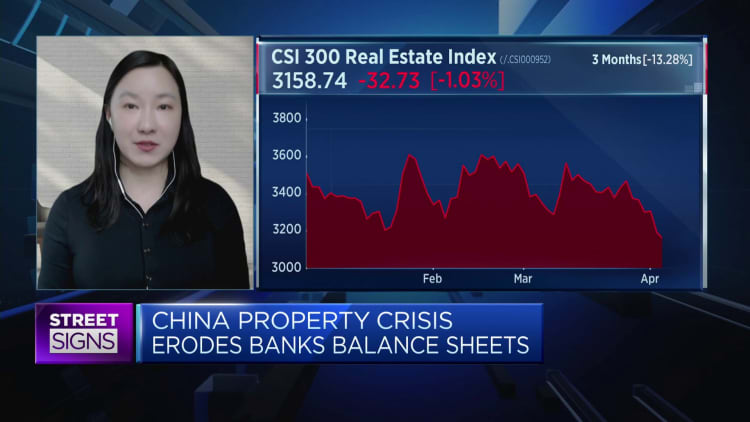Skyscrapers light up at night in the west coast new area of Qingdao, east China's Shandong province, March 22, 2024.
Nurfoto | Nurfoto | fake images
BEIJING – China's real estate woes are likely far from over and the industry's problems must be addressed quickly if overall GDP growth is to rebound significantly, according to a report released Thursday by global investment firm KKR.
That's one of two key takeaways from a recent trip to China by the firm's head of global and macro asset allocation, Henry H. McVey. It was his fourth visit in just over a year.
“A fundamentally overbuilt real estate industry needs to be addressed, and quickly,” he said in the report, which counts Changchun Hua, KKR's chief Greater China economist, among co-authors.
“Second, confidence must be restored to reduce savings,” McVey said, noting that would encourage consumers and businesses to spend on upgrades to higher-quality products, as Chinese authorities have promoted.
Real estate and related sectors once accounted for about a fifth or more of China's economy, depending on the extent of analysts' estimates. The real estate industry has slumped in recent years after Beijing's crackdown on property developers' heavy reliance on debt for growth.
Based on comparisons with real estate corrections in the US, Japan and Spain, China's “real estate market correction may be only halfway there” in terms of its depth, according to the KKR report.
“Both price and volume must be under pressure to finish the cleanup cycle,” the report says. “However, to date there has largely been a contraction in volume.”

While the KKR report did not provide many details on expectations for specific real estate policy, the authors said that further action by Beijing to improve China's real estate sector “could materially change investor perceptions.”
Amid geopolitical tensions, the country's slumping real estate market and falling stocks have given many foreign institutional investors pause on investing in China.
“According to some of our own survey work, many allocators have considered reducing China exposure to 5-6%, down from the current 10-12% at a time when we believe the fundamentals of the economy are likely bottoming out.” , says the KKR report.
Much of China's official data at the start of the year exceeded analysts' expectations.
Chinese officials have said the real estate sector remains in a period of adjustment, as Beijing shifts its emphasis toward manufacturing and what it considers “high-quality development.”
Authorities have also published policies to promote financial support for select real estate developers, while many local governments (although not necessarily the largest cities) have significantly relaxed restrictions on home purchases.
The resistance of the real estate sector will moderate
KKR expects a modest slowdown in China's GDP growth to 4.7% this year and 4.5% next, with real estate and Covid-related factors halving their drag on the economy from 1.4 percentage points in 2024 to 0.7 percentage points in 2025.
“Our conclusion is that: with the current [property] correction, as well as some possible additional political support, we believe that the burden for [the] “The overall economy should moderate somewhat in the coming years,” McVey said in a separate statement. He is also chief investment officer at KKR Balance Sheet.
Catering, accommodation and wholesale are expected to modestly increase their contribution to growth over the next two years, while digitalisation and the shift towards a more carbon-neutral green industry are expected to remain the main drivers of growth. growth, according to the report.
For investors, the report says a more important development than China's GDP growth would be whether authorities could make it easier for businesses and households to access capital markets.
“Repairing weak points in [the] “The economics, especially around housing, will ultimately improve the cost of capital and also allow new consumer companies to access the capital markets probably at better prices if real estate and confidence do better,” McVey said in the statement.
Beijing announced a GDP target of around 5% for this year in March. Housing and Urban-Rural Development Minister Ni Hong said last month that developers should go bankrupt if necessary and that the authorities would promote the development of affordable housing.
Recent data has pointed to some stabilization in the real estate sector slowdown. The seven-day moving average of new home sales in 21 major cities fell 34.5% year-on-year through Monday, better than the 45.3% drop recorded a week earlier, according to Nomura, citing Wind Information.
Compared to the same period in 2019, that sales average was only down 27.8% through Monday, down from a 47% drop a week earlier, Nomura said, noting that most of the improvement came in the largest cities in China.
Consumer perspective
KKR said the bulk of its local portfolio is in consumer and services companies, whose businesses reflect how Chinese in the middle to upper income range are spending modestly to improve their lifestyles.
“Revenue growth is strong, margins are holding up, and consumers are spending on less flashy items like 'smart homes,' pets and recreation,” the report says. “Domestic travel is also strong.”
In the longer term, KKR still hopes that China can follow historical precedent by changing its policy to be “more investor-friendly.”
“While our message is not a clear signal to lean,” the report says, “it is a reminder – using history as our guide – that if China adjusts its domestic policies to be more investor-friendly (especially as it concerns to supply-side reforms), this market could recover significantly from current levels.









